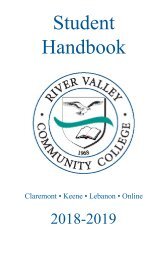You also want an ePaper? Increase the reach of your titles
YUMPU automatically turns print PDFs into web optimized ePapers that Google loves.
system of public community college education.” Further, state law (RSA 188-F: 6; F: 6 IV-<br />
Xii) delegates to the BoT “…the management and control of all the property and affairs of<br />
the Community College system, all of its colleges, divisions and departments…” and a<br />
number of general authorities in the financial affairs area. This includes, but is not limited<br />
to, the acceptance and transfer of funds, the preparation of the biennial capital budget, the<br />
authority to enter contracts, and the ability to obtain land and resources.<br />
The CCSNH Finance Committee is responsible for overseeing fiscal policies related to long<br />
range planning and budgeting for the System. The BoT is advised periodically with regard<br />
to long range financial planning in order to assess whether projected revenues and<br />
expenses are in balance and sufficient to meet stated missions and goals. The BoT then<br />
makes appropriate adjustments in order to provide for fiscally responsible operations over<br />
the long term. CCSNH develops a tactical plan for each biennial period that coincides with<br />
the state funding request cycle. These plans reflect priorities and positions articulated in<br />
both system goals and campus strategic planning documents.<br />
As the head of CCSNH, the Chancellor is responsible for the oversight and management of<br />
funds and other resources, as well as the preparation of all pertinent documents and<br />
materials that require committee review and/or approval. Additionally, the Chancellor has<br />
the responsibility to administer financial policies and present these policies for<br />
documentation necessary for the proper and effective exercise of the BoT’s fiduciary<br />
responsibilities.<br />
Each year, the Chancellor, the Board of Trustees and the College Presidents speak in front<br />
of the New Hampshire Legislative Finance Committees to discuss the CCSNH biennial<br />
report. As part of this review, the Chancellor develops and maintains the CCSNH Capital<br />
Projects Plan which incorporates each college’s six year master plan. These plans are then<br />
used as reference material when asking for allocations of money from the House and<br />
Senate. The BoT periodically offers advice with regards to the plans and estimates for<br />
major project cost and funding.<br />
The CCSNH Foundation is a 501(c) (3) with a mission to provide educational opportunities<br />
through financial assistance for student scholarships, program development, and college<br />
facilities enhancement. CCSNH adheres to all IRS non-profit fundraising policies and does<br />
not solicit favors that would conflict with public interest.<br />
Shared services and other economic efficiencies are handled through the Chief Operations<br />
Officer. Federal funding is handled per federal regulations by the Financial Aid system,<br />
Compliance Officer, and Financial Aid Director of each college. These employees ensure<br />
accurate financial information in Banner. To guarantee the integrity of each college and its<br />
finances, the System Office performs internal audits and ensures all policies and<br />
procedures are operating honestly and efficiently. A BoT subcommittee arranges annual<br />
external financial and A-133 audits, and findings are presented to the Board of Trustees to<br />
guarantee transparency. Financial Aid is also annually audited and recommendations for<br />
improvement are noted.<br />
To provide a system of checks and balances, the President is responsible for maintaining a<br />
balanced budget, approving financial transactions, and explaining any adjustments,<br />
transfers, and revenue/expense patterns to the System Office. The BAO assists the<br />
101 | P a g e





